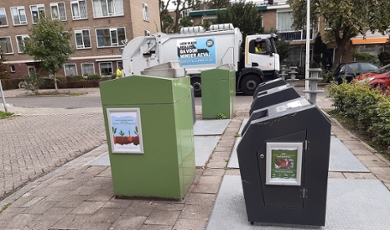RAAK grants secured for six AUAS research projects
7 Jun 2023 09:44 | CommunicationSeparating waste better, reaching out to young people in debt and reducing patients’ chronic joint pain are just some of the issues AUAS researchers will work on thanks to funding from the Regional Action and Attention for Knowledge Innovation (RAAK) public grant programme.
RAAK public research projects are designed to find solutions to practical problems in the public sector and involve universities of applied sciences and at least two public parties in both new and follow-up research. The AUAS receives a maximum of €300,000 for up to two years for each project.
Sustainable procurement and young people in debt
Lori Divito, professor of Collaborative Innovation and Entrepreneurship will conduct research into the circular procurement of materials in healthcare. She will work together with healthcare institutions, industrial laundries, a waste processing company and specialists in fabric production and textile technology.
The research groups of Stijn Sieckelinck (Youth Spot) and Anna Custers (Poverty Interventions) are, together with 15 youth work organisations, investigating how youth workers (Dutch) can be best deployed to reach and support young people with debt and financial problems. Youth workers are often able to reach this target group early, so there is a need to quantify and strengthen these workers’ commitment to combatting poverty and debt. Youth workers in many municipalities work to reduce poverty and prevent debt, but the methods they employ to do so vary widely.
Better waste separation and education in science and technology
The RAAK public research project of the Circular Design & Entrepreneurship and Psychology for a Sustainable City research groups, BASSTA (Dutch), looks at individual interventions for better waste separation. BASSTA-plus builds on this by investigating how promising behavioural interventions from BASSTA and other research can be effectively combined and tailored to local situations. Researchers Krispijn Faddegon and Maarten Mulder concluded recently that while people are certainly willing to separate their waste (Dutch), municipalities can do much more to help them do this.
Science and Mathematics Education research group Professor Bert Bredeweg's Minds-On project (Dutch) examines the importance of language in science and technology education. His research began by deploying a didactic tool in secondary education that uses an interactive diagram to help pupils learn how to reflect on the science experiments they perform in class. This showed that pupils lack the appropriate subject language to be able to successfully reflect on their work. The follow-up study will now look at how the new didactic tool can also contribute to improving language skills and vocabulary in science and technology education.
Self-management and the enjoyment of exercise
Professor Martin van der Esch (Interdisciplinary Care for Chronic Joint Disorders research group) is investigating in his Amsterdam Joint Self-Management Study (Dutch) project what people with chronic joint disorders can do themselves to prevent their symptoms from becoming worse. Using apps and online platforms can help them do this, but healthcare professionals often do not know how to apply these properly to supplement their existing professional supervision.
Enjoying sport is very important in encouraging people to exercise more, yet physical education (PE) teachers are often unaware of whether their lessons also achieve the desired effect. Professor Mirka Janssen (Movement in and around School research group) is together with teachers developing an instrument to monitor children's enjoyment during PE lessons.
The AUAS scored well in this RAAK application round, securing grants for six projects out of the round’s total of 23 grants awarded. More information about the 23 grants awarded by the Taskforce for Applied Research SIA can be found here (information in Dutch).

